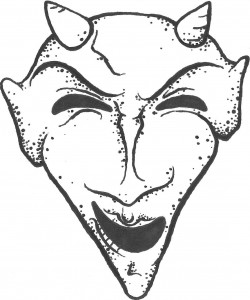An essay by Arthur Weiss, Ph.D., as provided by Franco Raud
Art by Franco Raud
This is what is known.
American Blues guitarist Robert Johnson (1911-1938). Singer of “Hellhound on My Trail,” “Me and the Devil Blues,” and “Cross Road Blues.” Johnson was granted his musical genius through a deal with the devil made at a crossroads outside the minor hamlet of Rosedale, Mississippi (although some musicologists contend that this occurred, conversely, at the crossroads of US Routes 61 and 49 in Clarksdale, Mississippi). The devil appeared to Johnson in the guise of a seven foot tall, jet-black skinned apparition, sometimes purported to have red eyes. In return for his soul, Johnson was given infernal mastery of the guitar and, some will argue, hypno-seductive powers over women. Prior to this incident, Johnson was considered a middling to competent guitarist. Perished after drinking a bottle of poisoned whiskey.
This is also known:
The crossroads at Rosedale had long been the nexus of Satanic goings-on and spontaneous musical ability. The first known Mephistophelean bargain occurred at the site in 1789, before the founding of Rosedale. Since that time, at least thirty-two known musicians have bartered their souls for excessive but short-lived greatness. Guitarists have proven to be the most statistically prominent bargainers, but the devil has also accepted deals with banjo players, fiddlers, pianists, and, in at least one case, an accordionist.
Other musicians of some prominence known to have sold their souls at Rosedale:
Blues guitarist James “Milkcat” Ahers (1911-1954).
Country/Western superstar Freddy Chetson (1947-1976).
Hector Alvarado, guitarist for the speed metal band “Rake’s Progress” (one of several bands known by that name) (1974-1996).
The common formula given for the Rosedale bargain:
The musician waits at the crossroads on the night of a full moon. Musician must have his instrument present. At midnight, the devil appears sitting on a log or stump, or in one account, in the boughs of a cypress tree, formerly unoccupied. Devil appears in the northwest quadrant of the crossroads (northeast quadrant according to historian and ethnographer G. B. Menken (1925-1989)). Devil takes instrument from musician, plays a number of minor chords and phrases (accounts vary), returns instrument to musician. Devil disparages musicians ability, suggests alternate profession, often manual labor. Musician, of own free will, expresses desire to offer soul for musical ability. Devil mocks. Musician persists. Devil makes offer. Verbal contract is sufficient, no documents are signed. Musician experiences three to seven years of musical genius, dies. Known deaths have consisted of poisoning, disease, hanging, choking, consumption, and stabbing to the throat or neck.
Common misconceptions:
Rosedale is not the legendary basis for the song “The Devil Went Down to Georgia” (1979) by The Charlie Daniels Band, which occurred in a different state and involved a different devil. The Rosedale bargain is a straightforward, mutual exchange and is not contingent on the outcome of a contest.
The devil of the Rosedale legend is the amalgam or translation of the Voodoo deity Papa Legba, god of the crossroads. This is not the case. It is the devil.
This is what is known.
Figure One
To read the rest of this story, check out the Mad Scientist Journal: Autumn 2013 collection.
Arthur Weiss, Ph.D., (1976 – present) received his doctorate in Comedic Studies from the University of Santa Barbara. His doctoral thesis, “A Day at the Arms Races: The Marx Brothers and the Birth of the Cold War,” will be published in November, 2014 by Mezzinger Press.
Franco Raud (1972 – present) lives in Ploom, Delaware. He has previously had a story, “The Pleasing Shapes,” published in Kasma Magazine and the story “The Pain Engine” published at Drunk Monkeys.
Follow us online:
